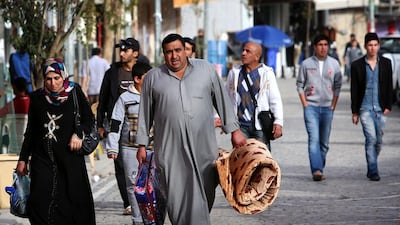SHAQLAWA, Iraq // When fighting erupted in Iraq’s Anbar province in December, Abu Mohammed fled with his family to a virtually empty summer resort far to the north to take advantage of its off-season rates and wait out the conflict.
But high season is about to begin in Shaqlawa, nestled beneath the Safin Mountains nearly 1,000 metres up, a place where Iraqis seek to escape scorching summer temperatures.
So naturally, hoteliers and landlords are starting to raise their rates.
But with no end in sight to the unrest back home, Anbaris like Abu Mohammed are running out of cash and face the unpleasant prospect of being forced to go back to it all.
The difficulties of these middle-class families are far from the worst faced by the province’s roughly 400,000 people who have fled their homes to escape fighting between security forces and militants, including from the powerful jihadist Islamic State of Iraq and the Levant.
But they illustrate the broad effect the violence has had, with some 10,000 families having made their way to Iraq’s autonomous northern Kurdish region, where Shaqlawa is located, according to the migration and displacement ministry.
Others have gone elsewhere in the country.
Of the Anbaris in Iraqi Kurdistan, around 2,500 families have gone to Shaqlawa, roughly 350 kilometres north of Ramadi.
“I don’t know what is going to happen,” said Abu Mohammed, noting that he was already struggling to make ends meet with rents at off-peak rates.
“I think about this every night.”
In early January, anti-government fighters overran parts of Anbar capital Ramadi, nearby Fallujah and several villages between them.
Since then, security forces have managed to retake most of Ramadi, but a stalemate persists in Fallujah.
Like others in Shaqlawa, Abu Mohammed refused to give his real name for fear of retribution upon returning home.
He fled with his wife and two sons in late January after anti-government fighters briefly kidnapped him.
Like others who have moved to the town, he did not even bother trying to find refuge in the Kurdish regional capital Erbil. There, Iraqi Arabs require local sponsors if they want to stay for long periods.
But the same rules do not apply in Shaqlawa, because of its status as a resort.
The central government has not set up formal refugee camps in the Kurdish region for those fleeing the fighting. Instead, it has offered Anbari families who register with the authorities a one-off payment of $250, as well as blankets and basic food items.
“I have money to live,” Abu Mohammed said. “Many do not.”
“But even for middle-class families, money does not last forever... Everything is expensive.”
He pays $750 a month for a small apartment, but others pay more. Then there is the cost of food and other necessities.
But rents are set to double, or even triple, as the summer season approaches.
Moreover, Anbaris complain that many vacant apartments and hotel rooms in Shaqlawa are now not even being let to keep them available for the lucrative summer trade.
“I brought enough money to stay for two months,” said Abu Abdullah, a farmer from the outskirts of Ramadi.
“I took my children out of school; we could not allow them to go because of the bombings, and the shortages of electricity and the cuts in the water supply.”
“My children lost a year of studying. This is my loss.”
No hoteliers and landlords agreed to be interviewed but, despite their frustrations, the Anbaris largely say they understand the rising rates, as the town is highly dependant on tourists.
But that doesn’t help.
“The cost of living here is high,” said Alia Al Bazzaz, the Erbil representative of the migration and displacement ministry.
“Students are facing problems because they are away from their schools, and employees are away from their jobs.”
In contrast to Kurds who have fled Syria’s civil war and come to Iraq, Anbaris are not concentrated in camps and so it is difficult to help them in a concerted manner, Ms Bazzaz said.
She also noted that, because the vast majority do not speak Kurdish, they have found it difficult to get jobs to replenish their savings.
“Even if they had some money, they have spent it in these two or three months,” she said. “They do not know for how long they will be here.”
“It is a hard issue.”
So now, running low on funds and with few other places to go, many face the frightening prospect of having to go home.
Anbari authorities are trying to project an image of calm having returned to the province and have called on those who fled to return, but the violence continues.
Just days ago, a massive suicide car bomb badly damaged a bridge in Ramadi, while clashes and shelling remain a regular part of life in Fallujah and surrounding areas.
“Every day, some families go back to Fallujah,” said Abu Mohammed, “but there are some families that are still coming from Fallujah.”
But “when someone now comes to Shaqlawa and finds a vacancy, it is not being rented out,” he said.
“They are waiting for the tourists.”
* Agence France-Presse

